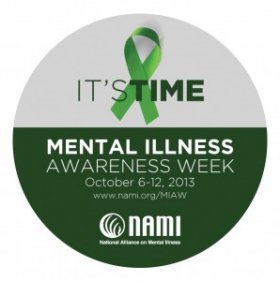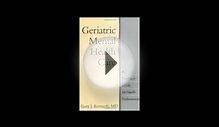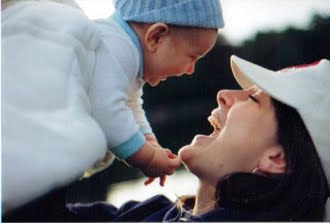
Geriatric mental Health care
How do you know if your loved one is experiencing symptoms of mental illness or just the normal changes of older age? Get the facts on mental illness in the elderly during Mental Illness Awareness Week.
 Did you know that about 20 percent of adults aged 55 or older have experienced some type of mental health concern, but nearly one in three of those seniors do not receive treatment? (; ) The statistics on mental illness in seniors are sobering, but with knowledge and vigilance, caregivers can stay aware of the mental and emotional health of their older loved ones and make sure they get properly treated if they are experiencing a problem. This week is, and there’s no better time to get educated on mental illness in seniors: the facts, the causes, and the symptoms to watch out for.
Did you know that about 20 percent of adults aged 55 or older have experienced some type of mental health concern, but nearly one in three of those seniors do not receive treatment? (; ) The statistics on mental illness in seniors are sobering, but with knowledge and vigilance, caregivers can stay aware of the mental and emotional health of their older loved ones and make sure they get properly treated if they are experiencing a problem. This week is, and there’s no better time to get educated on mental illness in seniors: the facts, the causes, and the symptoms to watch out for.
The Facts About Mental Illness in the Elderly
You might not be surprised to read that the most common mental health issue among the elderly is severe cognitive impairment or dementia, particularly caused by Alzheimer’s disease. An estimated 5 million adults 65 and older currently have Alzheimer’s disease—about 11 percent of seniors, according to the . Other types of dementia bring the numbers even higher.
Depression and mood disorders are also fairly widespread among older adults, and disturbingly, they often go undiagnosed and untreated. In a 2006 survey, 5% of seniors 65 and older reported having current depression, and about 10.5% reported a diagnosis of depression at some point in their lives (CDC).
Often going along with depression in many individuals, anxiety is also one of the more prevalent mental health problems among the elderly. Anxiety disorders encompass a range of issues, from obsessive-compulsive disorder (including hoarding syndrome) to phobias to post-traumatic stress disorder (PTSD). About 7.6% of those over 65 have been diagnosed with an anxiety disorder at some point in their lives, reports the CDC.
Causes and Risk Factors for Senior Mental Illness
One of the ongoing problem with diagnosis and treatment of mental illness in seniors is the fact that older adults are more likely to report physical symptoms than psychiatric complaints (CDC). However, even the normal physical and emotional stresses that go along with aging can be risk factors for mental illnesses like anxiety and depression. The lists a number of potential triggers for mental illness in the elderly:
- Physical disability
- Dementia-causing illness (e.g. Alzheimer’s disease)
- Physical illnesses that can affect thought, memory, and emotion (e.g. thyroid or adrenal disease)
- Illness or loss of a loved one
- Medication interactions
- Alcohol or substance abuse
Is it Mental Illness or Aging? 10 Symptoms of Mental Illness
As our loved ones age, it’s natural for some changes to occur. Regular forgetfulness is one thing, however; persistent memory loss or cognitive impairment is another thing and potentially serious. The same goes for extreme anxiety or long-term depression. Caregivers should keep an eye out for the following warning signs, which could indicate a mental health concern:
- Sad or depressed mood lasting longer than two weeks
- Social withdrawal; loss of interest in things that used to be enjoyable
- Unexplained fatigue, energy loss, or sleep changes
- Increase or decrease in appetite; changes in weight
- Memory loss, especially recent or short-term memory problems
- Feelings of worthlessness, inappropriate guilt, helplessness; thoughts of suicide
- Physical problems that can’t otherwise be explained: aches, constipation, etc.
- Changes in appearance or dress, or problems maintaining the home or yard
- Trouble handling finances or working with numbers
Don’t hesitate to seek help if your loved one is experiencing any of the symptoms above, urges the Geriatric Mental Health Foundation. There are professionals out there willing and able to help, including your family doctor, who is always a good place to start. You could also consult a counselor, a psychologist, or a geriatric psychiatrist. The important part is not to stand by and suffer alone. With the combined efforts of families, caregivers, and mental health professionals, we can help ward off mental illness in our older loved ones and make sure they are on the right track to healthy aging.
If you’ve had to cope with mental illness in an older loved one, we invite you to share your experiences and advice for our readers. Please feel free to join the discussion below.
More Articles
10 Symptoms of Mental Illness in the Elderly posted byRELATED VIDEO

![[PDF] Geriatric Mental Health Care: A Treatment Guide for](/img/video/pdf_geriatric_mental_health_care_a.jpg)

Share this Post
Related posts
Mental Health care Worker Jobs
Hospitals, clinics, and other health care facilities typically hire personnel under the title mental health worker to assist…
Read MoreMental Health care Statistics
The Substance Abuse and Mental Health Services Administration (SAMHSA) examines the mental health treatment each year through…
Read More
 The term maternal deprivation is a catch-phrase summarising the early work of psychiatrist and psychoanalyst, John Bowlby on the effects of separating infants and young children from their mother (or mother substitute) although the effect of loss of the mother on...
The term maternal deprivation is a catch-phrase summarising the early work of psychiatrist and psychoanalyst, John Bowlby on the effects of separating infants and young children from their mother (or mother substitute) although the effect of loss of the mother on...










